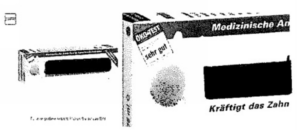Brand protection for a test seal – ÖKO-TEST
The case: The owner of the German test seal ÖKO-TEST [ECO-TEST] is the ÖKO-Test publishing house. The company tests goods according to their performance and purpose, and then provides relevant information about the results in its booklets. It offers a licence contract for its test seal to the manufacturers of the awarded goods:

The test seal is protected as an individual trade mark. It has been registered for, among other things, printed matter and consumer information and advice. Such an individual trade mark only serves to distinguish these registered services from those of other companies.
The publisher had not taken the opportunity to register a certification mark for the test seal itself. This mark would have distinguished award-winning goods from those which did not. Had the company done so, many problems in the present case could have been avoided.
A manufacturer continued to use the test seal originally acquired through a licence agreement for its new products after having made product changes on a new package without obtaining a new licence agreement:

The publishing house disputed this use and sued for an injunction on the basis of its trade mark right.
The publishing house however did not have a certification trade mark, but only an individual trade mark. It therefore had no right to dictate who was authorised to use its trade mark under the trade mark statutes. Its individual ÖKO-TEST trade mark only permitted the publishing house to claim the usual protection of trade marks.
This was problematic in the present case, because it was important that the protected goods and services of the publishing house would not be confused with the products of the manufacturer. Therefore, there was no likelihood of confusion despite identical signs.
However, the ÖKO-Test publishing house was in a good position because it could still claim the special protection that applied to brands that enjoyed a good reputation. It succeeded in proving that its test seal was well known and had a reputation. The publishing house had used the seal for over 25 years for its publication of test results and had made extensive investments for this purpose. To establish infringement of a well-known trade mark, it is sufficient for the reputation of the well-known trade mark to have been unjustifiably exploited or impaired.
The manufacturer had exploited the reputation of the test seal without any financial consideration in order to profit from the attractiveness, reputation and prestige of the seal. It was consequently prohibited from using the ÖKO-TEST seal, European Court of Justice, 11 April 2019, C-690/17 and Federal Court of Justice of 12 December 2019, I ZR 173/16.
Learnings: Test seal marks which are not registered as so-called certification marks are as a rule only protected against unauthorised use for the tested goods if they are recognised by a significant part of the relevant public and therefore enjoy a reputation. Proof of reputation requires complex investigations and is not usually easy to establish. Owners of test seal marks should therefore make use of the opportunity to register a certification mark in order to avoid having to rely on potentially problematic protection from other areas of law.
See also:
Protection of eco brands – GreenTec
Protection of organic brands – ZUM wohl